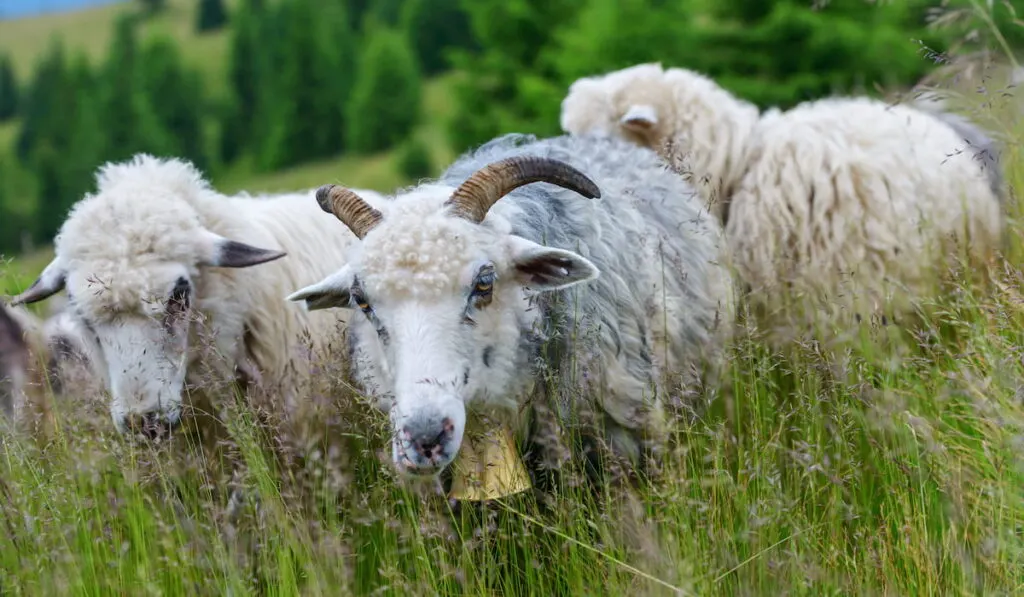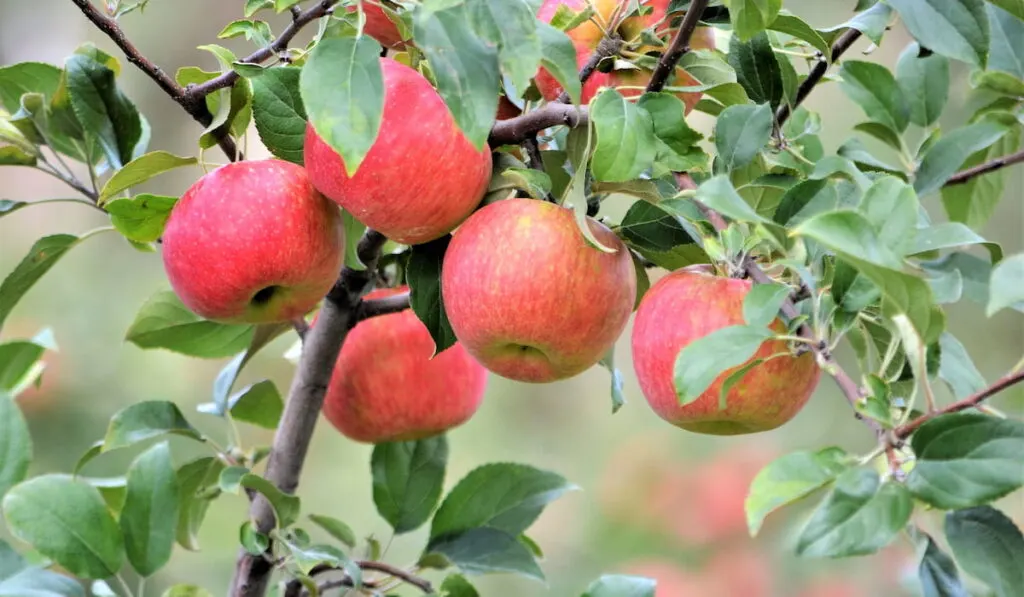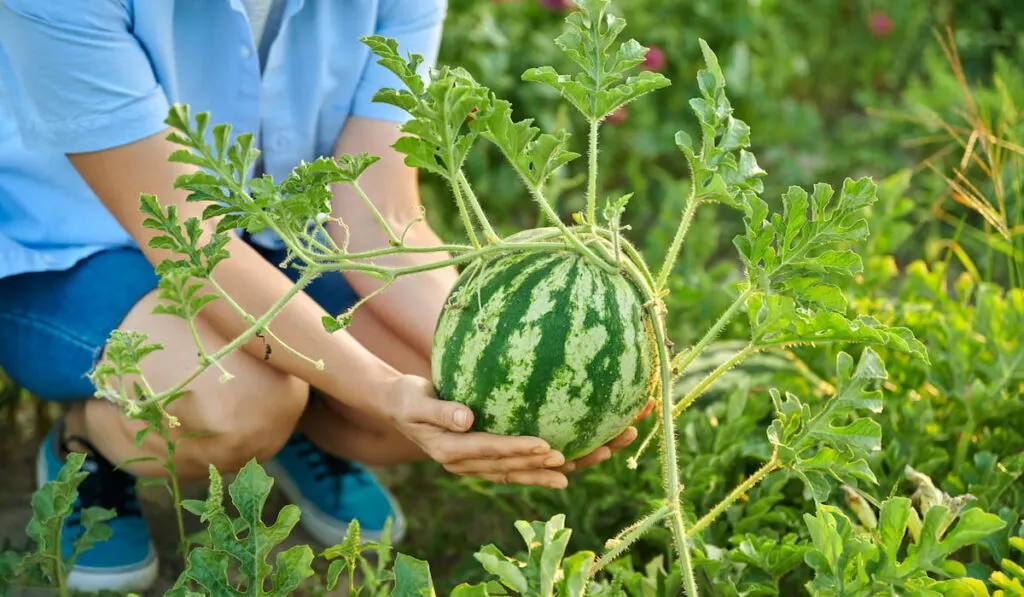Do Sheep Eat Fruit?
Yes, sheep do eat fruit.
They are ruminants that mainly eat grass and other vegetation. Fruit and fruit peels are generally given to sheep as treats and dietary supplements, as they are a rich source of fiber, potassium, antioxidants, and other valuable nutrients.
Sheep farmers incorporate fruits into their livestock’s diet because of their high nutritional value and availability. Fruit can also be less costly and healthier than commercial feeds, which are full of additives that may be less than desirable for the sheep.
Fruits are a great supplement for sheep, especially during dry seasons when forage may not be of high quality.
Compared to other livestock like goats, sheep are a bit picky about their choice of food, even when it comes to fruits.

Fruits are highly nutritious and can be an important part of their diet, but you should be careful not to overfeed them. It is recommended to feed fruits moderately, as a treat, or as a small part of their everyday menu to prevent overfeeding.
Remember they are ruminants, and their digestive system may not deal well with too much fruit.
In this respect, farmers should have adequate and reliable knowledge on a variety of fruits, including their nutritional value to the sheep, and the preferences of their sheep to avoid overfeeding their livestock.
What Foods Are Best for Sheep?
Since sheep are ruminants, their digestive system is designed for forage feeds. Their most ideal feed is grass and vegetation with broad leaves. Other feeds such as clover and legumes are also good for the sheep.
The nutritional value of forage depends on the type of plants and grasses and the season that the forage grew in. Fresh forage is highly nutritious and preferred for livestock, compared to dry forage.
Fruits can be given to sheep, preferably as supplements or treats, or mixed with the forage. Vetch, alfalfa, and red clover are a few forage types with higher nutritional value as compared to other forage types like grass.
Forbs and other broadleaf plants are among a sheep’s favorite feed. They also tend to like plants with rugged, leafy structures. Sheep thrive on feed with high nutritional value, particularly quality pasture such as mixed grasses and a variety of clovers.
Nutritional Value of Fruits to Sheep
Every fruit has specific nutritional values. To the sheep, some fruits are more nutritious and others may be more palatable. Regardless of these variations, there are some nutrients common in all fruits.
Among the major nutrients common in many fruits are vitamins, dietary fiber, and minerals. All of these nutrients contribute to the health of sheep. Fruits also boost the immune system and help in fighting off free radicals that cause oxidative stress.
Among the common nutrients in fruits are:
- Potassium – This is the main mineral found in cell fluids and is essential for cell buoyancy. Besides being essential for the electrolyte balance, potassium is also crucial for bacterial fermentation in the stomach chambers of sheep.
- Fiber – Fiber is crucial for a healthy gut in sheep. It aids in digestion, encourages the growth of the gut bacteria, and facilitates easy movements in the bowel. Fruit peels are a great source of fiber, and it is advisable to share some with your sheep to promote a healthy gut.
- Vitamin C – This nutrient aids the immune system. Besides preventing hepatic lesions, and various forms of stress, like heat stress, vitamin C also helps in fighting the damaging effects of toxins, such as endotoxin.
- Vitamin A – This vitamin plays a vital role in the growth and development of sheep. This includes improvement and maintenance of fertility, immunity, night vision, growth, and maintaining and keeping in check the functions of the epithelial tissues.
- Magnesium – This mineral encourages normal feeding habits. Deficiencies are often characterized by reduced appetite and reduced feed consumption. It also aids with relieving stress, lambing, and milk production, in cases of lactating sheep. Gas tetany is a condition associated with extremely low levels of magnesium and can be fatal if not timely addressed.
- Antioxidants – among the common antioxidants in fruits are catechin, quercetin, and chlorogenic acid, useful in fighting free radicals, combating stress, and fighting disease infections.
The sheep’s stomach comprises four chambers, mainly designed to handle and digest forage.
Farmers are therefore advised to gradually introduce fruits to the sheep as feed supplements or occasional treats, but not as a replacement to a normal sheep diet.
Fruit rations also differ depending on the availability of the fruit, and the palatability of the fruits to the sheep.
Farmers should have sufficient knowledge of the required rations for their livestock, including supplements and additives when necessary.
Most importantly, not all fruits are good for sheep. Some fruits, such as cherries, elderberries, plums, and avocados are extremely toxic and detrimental to the health of the sheep. Some can at times be fatal.
Let’s take a look at the fruits that sheep can eat.

1. Apples
Apples are good for ruminant animals like sheep because of their nutritional value. They are a rich source of vitamins A, C, fiber, potassium, magnesium, antioxidants, and other minerals.
These nutrients and minerals are responsible for maintaining health, improving immunity, neutralizing the damaging effects of endotoxins, and even balancing pH in the stomach.
Apples are best fed in the middle of the day as supplements for a balanced diet, to avoid affecting their usual grazing patterns.
The best way to feed these fruits is by slicing the apples into manageable chunks and combining them with forage, hay, and legumes to ensure a balanced diet. Apples should ideally constitute around 10% – 20% of the diet.
Sheep do not find or eat apples naturally, so they should be gradually introduced in their diets. You should also avoid overfeeding apples to your sheep to avoid the production of stomach gas because of the acidity in apples.
Excess gas can lead to bloating, stomach aches, and diarrhea. It is also important to remove the apple seeds because they are toxic.
2. Pears
Pears are occasionally given to sheep as treats and supplements to improve their health, boost the immune system, and maintain their body functions.
They are light and neutral fruits rich in several vitamins, fiber, potassium, and proteins.
Pears should gradually be added to the sheep’s diet to survey the palatability of the fruit, their body response, and if they like the fruit.
Pears are known for their high fiber, which is crucial to digestion and the movement of food within the stomachs.
3. Bananas
Bananas can be used as treats for your sheep. They are a great snack choice full of fiber, potassium, vitamins, and lots of antioxidants. Bananas greatly improve digestive health and stabilize the body’s pH.
In the case of vegetable leftovers such as stalks and others edible to the sheep, it is advisable to add banana peels on top and give them to the sheep.
This way you reduce food waste and the sheep will enjoy a tasty snack. So to wrap it up, it is a big nod to bananas.
4. Oranges
Oranges are loaded with plenty of vitamins and nutrients that are important for boosting immunity, maintaining health, and enhancing digestion.
Just like other fruits, they should be fed to the sheep in appropriate ratios to enhance proper health.
Overfeeding oranges to sheep can cause digestive issues that could prove fatal at times. They should also be gradually introduced to monitor their response to the fruit.

5. Watermelons
Watermelons have been proven to be great refreshing treats for both animals and humans.
They are loaded with many nutrients essential for normal body functioning, improving immunity, and most importantly, hydration on warmer days.
Their rinds are rich in fiber and are good for supplementing a balanced diet. They should however be given in moderate amounts to avoid overfeeding.
Effects of Overfeeding
Sheep are ruminants, implying that their digestive systems are designed to digest grass and other forage feeds.
Fruits supplements do provide necessary nutrients for improved performance, but overfeeding them may cause digestive issues. Some fruits also have high natural sugar levels, which is not ideal for sheep.
Conclusion
Fruits should be given to sheep in the right proportions, depending on their palatability and other factors such as the levels of natural sugar in them, to avoid the adverse effects associated with overfeeding the respective fruits.
Generally, fruits are famed for their minerals which enhance performance, health, and allows for teeth, muscle, and bone development. Fruits should generally be sliced before giving them to sheep to ensure safety and avoid choking.
Resources
- https://farmhouseguide.com/what-fruits-can-sheep-eat/
- https://agricsite.com/can-sheep-eat-fruits/
- https://farmhouseguide.com/can-sheep-eat-apples
- http://www.scielo.br/scielo.php
- https://thetilth.com/can-sheep-eat-bananas
- https://survivingmexico.com/tag/feeding-oranges-to-sheep/
- http://www.thelambpen.com/forum/index.php?topic
- https://opensanctuary.org/article/daily-diet-treats-supplements-for-sheep/
- http://www.sheep101.info/eating.html
